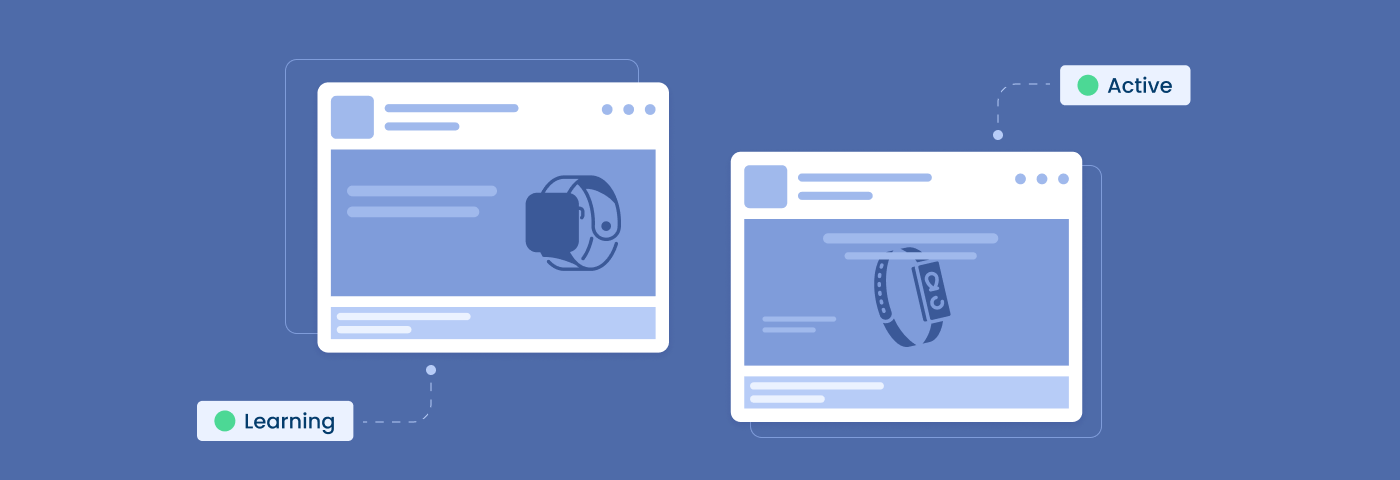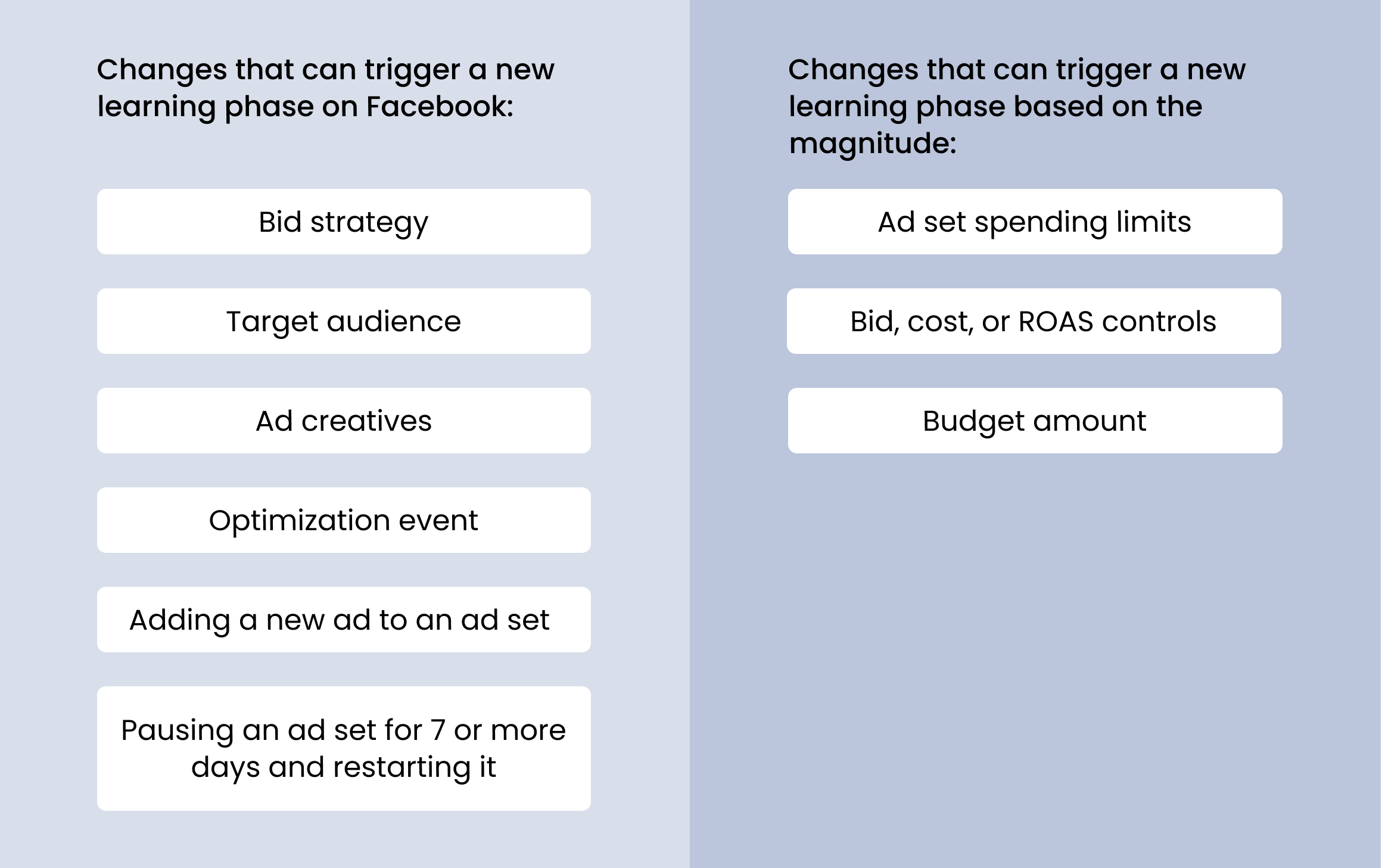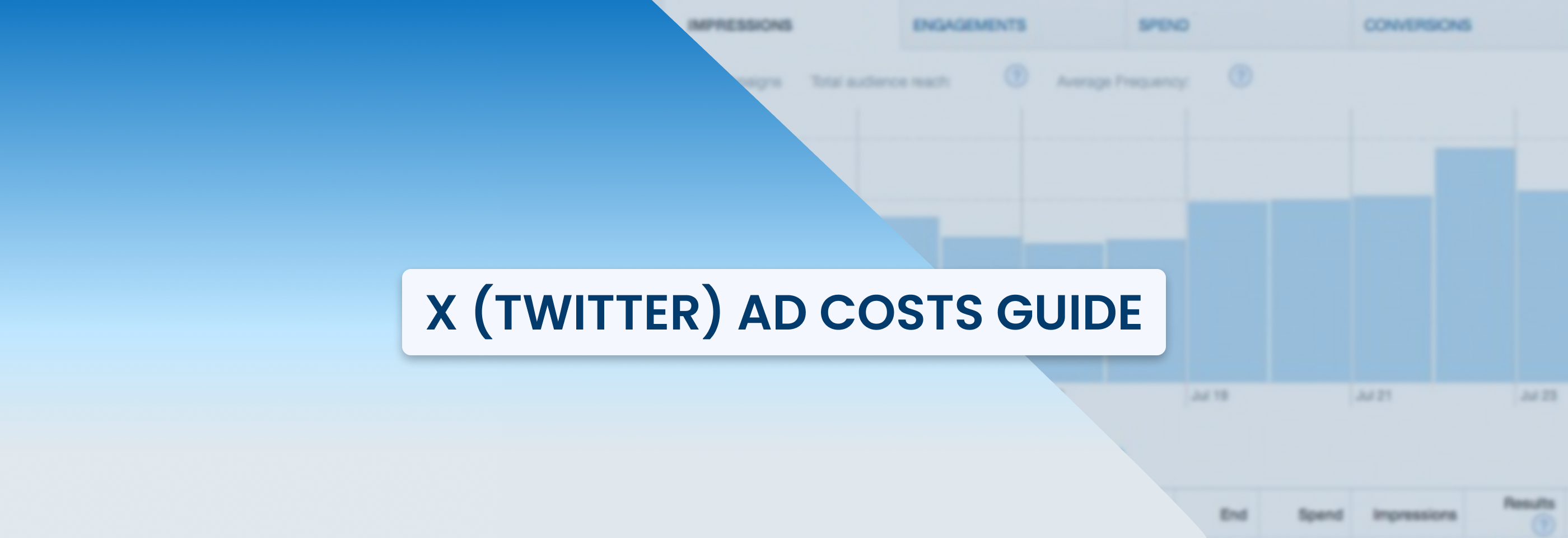Conquering Facebook Ads Learning Phase: Key Things to Consider
2024-05-07

Once you finish creating your Facebook ads, be prepared that your ads might not start running right away. They will likely enter what is known as the Learning phase instead, leaving you guessing what to do about it and how to finally kickstart your advertising campaign.
In this article, we’ll explore the basics of the Facebook ads learning phase, including what it is, how it works, and what you can do to finish it faster.
Facebook ads learning phase basics
Basically, the learning phase on Facebook is the process when Facebook's ad delivery system gathers data and learns how to best deliver your ads to achieve your campaign objectives.
How does the learning phase work?
As you may know, Facebook’s system learns more about your target audience every time your ad is shown to it, optimizing the delivery of your ads to help you achieve the best results. The learning phase is the first step of this process when Facebook is only starting to figure out how to deliver optimal results to you based on the patterns in ad performance.
You can see when your ads are in the learning phase in your Meta Ads Manager: the Delivery column will show “Learning” as the ad status to indicate it. Read one of our previous articles to learn about the other ad statuses in your Facebook Ads Manager and what they mean.
During the learning phase, the results from your ads might not be very consistent, and you might have to spend more to achieve them. Think of it as a trial period: Facebook’s algorithms will experiment and try to find the most effective way to reach your target audience and achieve your advertising goals. As the learning phase progresses and Facebook gathers more data, your ad performance will improve, and the cost per result will get lower.
The important thing to understand about the Facebook learning phase is that it starts not only when you create new ads but also when you make significant changes to your existing ads. However, what kinds of edits does Facebook consider to be significant?
What changes can trigger the learning phase?
Each little change to your ads can have an impact on their delivery, but not all of them will lead to a new learning phase.
Here are the changes that are considered significant enough to trigger a new learning phase:
- Changing your target audience;
- Changing your ad creatives (images, texts, etc.);
- Changing your optimization event (for example, switching it from clicks to purchases);
- Changing your bidding strategy; Introducing a new ad to an existing ad set; Stopping your ad set for a week or more and then restarting it.
There are also changes that can lead your ad sets to re-enter the learning phase in specific cases:
- Changing the spending limit of your ad set;
- Changing your bid, cost, or ROAS control;
- Changing your budget amount, especially if you use campaign budget optimization (in this case, multiple ad sets within this campaign can re-enter the learning phase).

Mostly, it all depends on the severity of the change. For example, if you change your budget only a little (e.g., increase it from $50 to $60), your ad sets are unlikely to re-enter the learning phase. But if you make a significant increase (e.g., from $50 to $500), the chances are that your ad sets will get back into the learning phase due to such a big change.
How long does the Facebook learning phase take?
Usually, it takes approximately 50 optimization events for your ad sets to finish the learning phase.
On Facebook, the optimization event is the number of times your ads achieve the desired outcomes you’re optimizing your ad set for based on your attribution setting. This number shows how many optimized events happened during the selected conversion window.
If there's a time delay between seeing the ad and the event happening (e.g., when a user saw your ad on Monday but purchased from your business on Friday), Facebook will use an attribution window that matches your conversion window. The longer the attribution window of an ad set is, the longer it will take for it to exit the learning phase.
Essentially, your optimization events determine what you’re bidding for in the Facebook ad auction and help you understand how well your bid strategy aligns with your objectives. Making sure that your bid strategy is aligned with the optimization event is important for Facebook’s system to learn how to deliver your ads to users most likely to take the action you’re optimizing for. Keep in mind that your optimization event can be different from the campaign goals: you can optimize your ad sets to get more clicks while running the campaign itself with a sales objective.
In short, it's important to get an adequate number of optimization events since the last significant edit to your ads to maintain stable ad delivery. Also, the number of 50 optimization events is the average amount recommended by Facebook: some of your ad sets can stabilize even sooner.
The Facebook ads learning phase and campaign budget optimization (CBO)
Another aspect worth paying attention to is how the learning phase may be affected by using a Campaign Budget Optimization (or CBO for short) feature. CBO allows you to automatically distribute your campaign budget across ad sets to get the best results. This means that when you enable CBO, Facebook's algorithm considers the entire campaign budget rather than allocating budgets at the ad set level.
Here are key things to understand about CBO and how it relates to the learning phase:
- The duration of the learning phase will be the same for the ad sets using CBO as in the case of the ad set budgets;
- Your ad sets won’t re-enter the learning phase as the CBO distributes the budget between them;
- A change in one ad set (even if it is significant) won’t lead to other ad sets within a campaign with a CBO re-entering the learning phase;
- Adding a new ad set to the campaign with a CBO won’t trigger other ad sets to re-enter the learning phase.
Overall, CBO can positively impact the performance of your ads as it provides more consolidated data, faster optimization, budget flexibility, and stability, so you shouldn’t worry about it impacting the duration of your ads’ learning phase.
How to exit the Facebook ads learning phase quickly?
As we’ve said before, during the learning phase, your ad sets’ performance will be unstable, and you’ll probably have a higher CPA than what you’ve expected. It is completely normal, however, there are certain things that can help you exit the learning phase faster and avoid getting your ad sets re-entering it.
Here is what Facebook recommends to successfully finish the learning phase:
1. Don’t edit your ad sets until they exit the learning phase
Ad performance during this period can fluctuate, so making changes may disrupt the optimization process. It’s best to wait until the learning phase is finished to allow the delivery system to optimize more effectively.
2. Don’t make unnecessary edits that trigger ad sets to re-enter the learning phase
Any significant changes to your ads or ad sets can reset the learning process, which will impact your ad performance. Only make edits when you have a valid reason to expect improved results.
3. Don’t create too many ads or ad sets
A high number of ads can dilute the learning process, leading to less effective optimization. Instead, consolidate similar ad sets to finish the learning phase faster and improve overall performance.
For example, if you want to run multiple ad sets to target specific locations, combine them based on how similar they are or choose store traffic as the campaign objective. The same goes for creating ad sets for different languages: you can make a one ad set instead of many and select multiple languages within it.
4. Set realistic budgets
Your budget should allow your ad sets to get the required number of optimization events. A budget that is too low or too high can mislead Facebook’s system and it won’t be able to identify the audience to optimize your ad delivery for. Choose a budget high enough to generate at least 50 optimization events, and don’t change it too frequently.
While the learning phase is essential for optimizing ad performance and ensuring consistent ad delivery, it's important not to rush through it. Testing new strategies and creative approaches can lead to long-term performance improvements, so do not be afraid of the learning phase and do what’s necessary to make the most of it.
Besides the learning phase, there is another ad status that you can encounter in your Ads Manager called Learning Limited. Let’s explore what it means and what you can do about it.
What to do when your Facebook ads are stuck in the Learning Limited?
Learning limited means that your ad set couldn't exit the learning phase as it didn't generate the necessary number of optimization events (i.e., 50) during one week after the last significant edit to your ads.
Here’s why your ads might get stuck in the learning limited and what to do about it:
1. Small audience
If there aren’t enough users in your target audience, the ad set won’t be able to generate the right amount of optimization events.
How to fix it: try targeting a broader audience to finish the learning phase.
2. Low budget or bid/cost controls
Ad sets typically need to generate 50 optimization events within 7 days, so you have to allocate a budget high enough to achieve that. Setting your budget and bid/cost controls too low can result in your ads not receiving enough optimization events.
How to fix it: consider the size of your audience, the expected CPA in your niche, and other factors to set an appropriate budget and bid or cost controls. For example, if you’re optimizing for clicks and an average CPC for your campaigns is around $2, you’ll need to set a budget of at least $100 to get 50 optimization events during one week.
3. A rare optimization event
Choosing an event that doesn't occur often enough may cause your ads to get stuck in the learning phase. It’s important to choose a realistic optimization event that is likely to happen at least 50 times a week.
How to fix it: choose an event that doesn’t require as much commitment from your target audience. For example, you can choose adds to cart instead of purchases to exit the learning phase quicker.
4. Too many ads
Running multiple ads or ad sets at the same time not only prevents Facebook from learning enough about the performance of each of them, but can also lead to auction overlap.
How to fix it: combine similar ads and ad sets for better results.
Recap
The learning phase on Facebook plays an important role in your overall advertising journey on the platform. During this phase, Facebook gathers data to optimize ad delivery to help your ads reach the right audience and get cost-effective results.
While your ads are in the learning phase, it’s crucial to be patient and make sure you’re minimizing the factors that can make it longer or cause your ads to get stuck with the learning limited status.
Remember these key points to successfully finish the learning phase and achieve optimal ad performance:
- Be patient. Allow your ad sets sufficient time to gather optimization events and exit the learning phase naturally.
- Avoid unnecessary edits. Refrain from making significant changes to your ads or ad sets during the learning phase to not disrupt the optimization process.
- Monitor ad performance. Keep a close eye on your ad metrics to track progress and identify areas for improvement.
- Optimize strategically. Align your bid strategy with your optimization goals, and choose relevant optimization events to guide the learning process.
- Consider audience size and budget. Ensure your audience size is adequate, and your budget is sufficient to support your optimization goals.
- Combine similar ads and ad sets. Prevent audience overlap and streamline the learning process by consolidating similar ad sets.
And finally, remember that the learning phase is just a temporary process that will come to an end. Once Facebook gathers enough data, your ads will exit this phase and start delivering more consistent results while maintaining an optimal CPA. By implementing the tips in our article, you can avoid getting your Facebook ads stuck in the learning limited and let them finish the learning phase faster.

